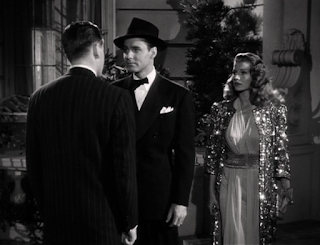This film is a studio system star vehicle, and Rita Hayworth deserves it. She owns the screen whenever she appears, from her justly-famed entrance flinging her hair up from the bottom of the frame to the fulfilled look on her face as she and Johnny exit the door at the end. She brings intensity to all the aspects of her character. She deploys her considerable sexual allure when she digs at Johnny by seductively dancing with another man early in the film, and she’s a nonchalant minx on the arm of another man when she returns home late one night to Johnny's glare. She brings the same sex appeal to bear on her two big dance sequences, one a bare-midriff tropical performance and the other her famous club performance, wrapped in strapless, black gown with arm-length gloves. Director Charles Vidor enhances this latter performance with a close-up that excludes the gown and by having a couple of excited men offering to help her with her dress, but it’s Hayworth’s charisma that brings the electricity here. She knows how to tease the camera and the men who gaze at the screen.
But Hayworth’s Gilda doesn’t control all parts of her life as thoroughly as she does her sex appeal. Beneath her meanness to Johnny is her love for him, and she alternates between mourning the loss of whatever relationship they had and openly flinging herself at him. Hayworth brings as much intensity to these scenes as she does to her vixen play. Her hair flies as wildly when she’s angry as it does when she seduces, and it adds to the pathos of her submission to Johnny.
The same over pressured tension that drives Gilda also drives Johnny. The male in this 40s film has to choose between his allegiance to the other male, Ballin, or to follow his heart to Gilda. For most of the film, Johnny chooses patriarchy and coldly busies himself with keeping Gilda at the ready for Ballin, but Gilda suspects his motives are mixed. She thinks he’s keeping her from other men because of his own repressed jealousy. There’s more than a passing similarity between Johnny here and the aloof Devlin with his loyalty to his job in another 1946 film, Hitchcock’s Notorious. But in Gilda, even after Ballin’s death, Johnny continues to repress Gilda, coldly seducing her into marriage and then locking her away with a portrait of Ballin dominating her new home. The extremes of Johnny’s emotions become even more apparent when he has Gilda brought back to him after her escape and the two confess their love. Glen Ford isn’t able to convincingly deliver Johnny’s repressed turmoil, but the scripted actions of Johnny tell the story well enough.
A lot of this film is hard for a contemporary viewer. We would prefer to see such a powerful woman more in control of herself, and the extremes of Johnny's actions are difficult to completely accept, even when we only see them as external actions. But Hayworth’s performance alone make Gilda a cinematic pleasure to enjoy anyway, and when the overwrought psychology of the characters and the quicksilver quality of their relationship are added to the mix, Gilda becomes an genuine cinematic pleasure.


